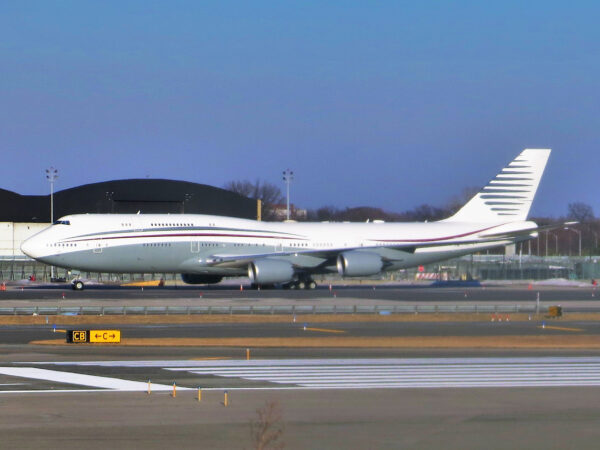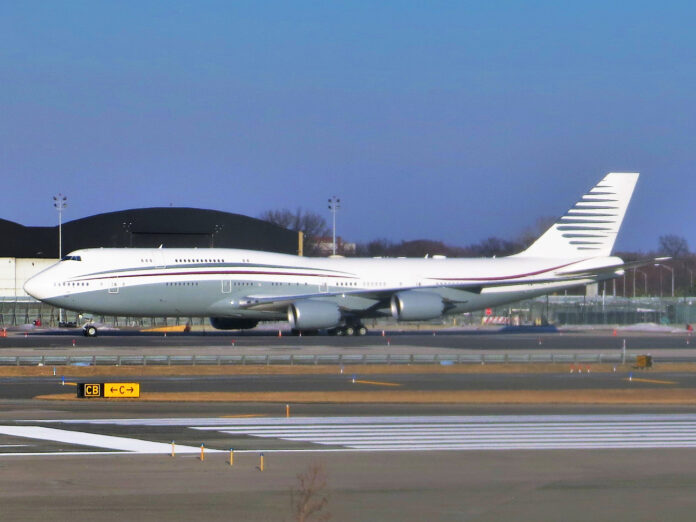WASHINGTON D.C. – The U.S. government has formally accepted a luxurious Boeing 747-8 jet from Qatar, a gift intended to eventually join the coveted Air Force One fleet, a move that has immediately ignited a firestorm of criticism from across the political spectrum and raised significant questions about cost, legality, and national security.
Chief Pentagon spokesman Sean Parnell confirmed on Wednesday that the Secretary of Defense had accepted the Boeing 747 “in accordance with all federal rules and regulations.” The aircraft, a lavishly appointed “palace-in-the-sky” estimated to be worth $400 million, was previously part of the Qatari royal fleet.
President Donald Trump, who recently toured the plane in Palm Beach, Florida, near his Mar-a-Lago resort, has been a vocal proponent of accepting the gift. He has argued that turning down a “free” and “very expensive airplane” would be “stupid” and a disservice to taxpayers, suggesting it could temporarily replace the aging current Air Force One jets, which have been in service since 1990. The White House has indicated the plane will eventually be transferred to Trump’s presidential library at the end of his term.
However, the acquisition has been met with immediate and fierce pushback. A central point of contention revolves around the U.S. Constitution’s Emoluments Clause, which prohibits federal officials from accepting gifts from foreign governments without congressional consent. Critics, including some of Trump’s own Republican allies, argue that the transfer has not received proper congressional approval and raises serious ethical questions.
“I think it’s not worth the appearance of impropriety, whether it’s improper or not,” Senator Rand Paul (R-KY) told Fox News, adding, “I wonder if our ability to judge [Qatar’s] human rights record will be clouded by the fact of this large gift.” Senator Ted Cruz (R-TX) also raised concerns about “significant espionage and surveillance problems” posed by accepting a secondhand foreign aircraft.
The administration, however, maintains the transaction is entirely legal, asserting that the plane is being gifted to the U.S. Department of Defense and not to President Trump personally. Qatari Prime Minister Sheikh Mohammed bin Abdulrahman bin Jassim Al-Thani echoed this sentiment, stating the transfer “is a government-to-government transaction… It’s between the two defense ministries.”

Beyond the legal and ethical wrangling, the sheer cost of converting the luxury jet into a fully operational Air Force One-grade aircraft presents another colossal hurdle. Experts warn that outfitting the plane with the advanced security systems, robust communications capabilities, and highly classified defensive measures required for presidential travel will be an arduous and expensive undertaking.
Mark Cancian, a senior adviser with the Center for Strategic and International Studies, estimates the retrofitting costs could easily run to $1 billion – more than twice the estimated value of the plane itself. This involves stripping out the opulent interiors to install everything from shielding against electromagnetic pulses (EMP) to secure command suites, medical facilities, and mid-flight refueling capabilities. Industry analysts suggest such an overhaul could take years, making the idea of it being a “temporary” replacement before new Boeing 747-8s are delivered (currently slated for 2027-2029) highly optimistic.
The current Air Force One fleet, consisting of two customized Boeing 747-200B jets, has been in operation for over three decades. Boeing is already in the process of converting two new 747-8s to replace them, a project that has faced significant delays and cost overruns. The acceptance of the Qatari jet adds another layer of complexity to this already protracted and expensive endeavor.
While the White House has highlighted the “free” nature of the gift, the hidden costs and the ethical thicket it navigates are likely to ensure this “palace-in-the-sky” remains grounded in controversy for the foreseeable future. The full ramifications of this diplomatic offering, from its financial burden on taxpayers to its potential impact on U.S. foreign policy, are only just beginning to unfold.
